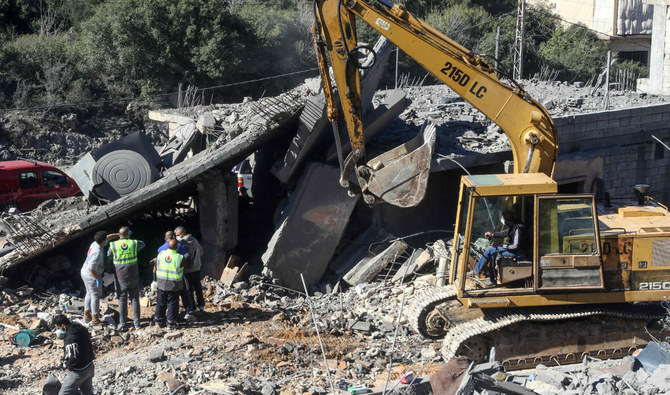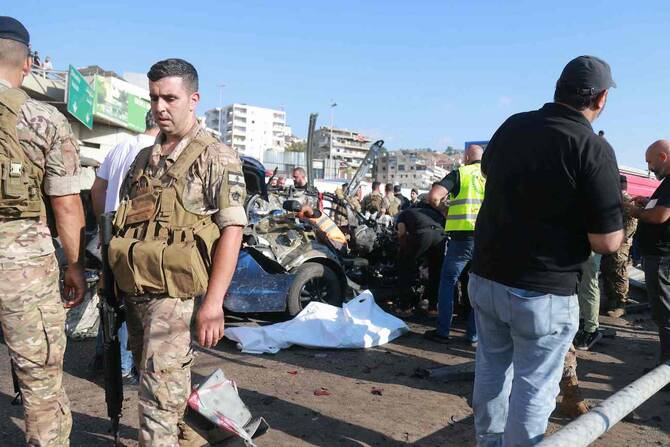BEIRUT: Volunteers in southern Lebanon are defying Israeli bombing to feed and care for dogs, cats, birds and other animals that have become victims of the conflict.
Linda Luku — a native of Bint Jbeil now residing in Tyre — is among a growing number of volunteers who have mobilized via social media to support animals amid the military escalation between Hezbollah and Israel.
Their efforts provide a lifeline to the forgotten victims of war as clashes continue to claim the lives of Hezbollah operatives and Lebanese civilians, including innocent children and women.
Amid the clashes between Hezbollah and the Israeli army, thousands of residents of the border region in southern Lebanon have abandoned their homes and villages in recent months.
In heartbreaking decisions, many families opted to leave their cherished pets behind, hoping that their displacement would be short-lived.
With military operations escalating and airstrikes pounding the region, villages have been transformed into desolate ghost towns, leaving animals abandoned and vulnerable to starvation and bombing.
Luku recounted the heartbreaking scenes she encountered during a visit to her hometown of Bint Jbeil.
Stray cats and dogs — emaciated and desperate — roamed the streets, their suffering palpable as their ribs protruded from hunger.
The sight was particularly harrowing for Luku, who, moved by compassion, set out with her brother on a mission to provide relief.
They managed to secure leftover chicken from a local slaughterhouse in Maaroub owned by a friend, and then journeyed to their hometown to distribute food to the starving animals.
“These animals are not strays. They belong to beautiful breeds commonly kept as household pets. They are now left to fend for themselves, searching for sustenance in towns abandoned by humans,” Luku said.
She added: “It is a poignant scene. As I navigate through these towns, I am confronted with the sight of starving animals, and the distressing images linger with me through the night.
“Amid the conflict, there is a heartbreaking lack of awareness. Residents remaining in villages under bombardment often withhold food from these animals.”
“Many times, I traverse villages devoid of human presence, with only Israeli warplanes hovering above, surveilling the area.”
Qassem Haidar, 28, from Shaqra in southern Lebanon, still lives in the area with his family despite facing constant bombardment.
“I have my own business, yet I sympathize with animals,” he said, adding: “I started feeding animals in my village after I was shocked to see a dog eating a cat in Beit Leif. It was so horrible. I could not stand it.
“I resorted to social media, asking anyone who had food leftovers to keep them, taking it upon myself to collect and distribute them to abandoned animals.
“I took photos of the hungry animals and posted them online. Many showed sympathy, and I started receiving donations, from dry food bags to gasoline costs, to move around between the villages.
“I also reached out to animal welfare organizations. I dedicate three hours of my time every day to going around the villages and posting stories on Instagram.
“I visited every village in the border area, from Ayta Al-Shaab to Kfarkela, spending a few minutes in some due to the bombardment and more than an hour in others.
Haidar said: “I used to leave food on the sides of the roads. Sometimes, if I come across a civilian still in his house, I leave bags of food at his place so that he can feed the animals.
“I also cooperate with the medics in the region to distribute food to animals. I have a town visit schedule, and I know when I should return and visit them to leave food for the animals.
“I don’t want to be late, so they do not starve to death or eat each other. I have seen cats and dogs that died of cardiac arrest due to the sound of exploding shells. Their heartbeats were so fast. They experienced absolute terror.
“They know when a shell is about to drop, and they disperse before it does. I followed their instincts and survived bombings more than once. Israelis bombed the sites I was at in many towns five minutes after I left them.
“I often used to be the only person on the road in towns in the line of fire. My mother is always worried about me. However, I am convinced these lives cannot be abandoned,” he added.
Haidar’s mission goes beyond feeding dogs, cats, and birds. He also takes sick or wounded animals to local vets.
Firas Faraj, a founder of the Strays Welfare Association in Tyre, said that many of the pets left behind are waiting for their owners to return.
He added: “We do not have an accurate number of abandoned animals, yet we are dealing with the problem case by case.
“The issue has gained some sympathy, but the need is still greater than what is provided. UNIFIL forces previously sympathized with us since the unit commanders love animals and provided us access to a field hospital.
“However, with the opening of the southern battlefront, all aid was suspended, and we rely on individual initiatives.”






















